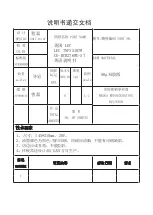
GB
64
Moving the door
•
The door opening direction can be changed for models without handles.
•
In order to change the direction of opening your freezer, you must contact the nearest authorized service
center to request a change of door opening.
BEFORE CONTACTING THE AFTER SALES SERVICE
If your refrigerator does not work:
•
Was there a power outage?
•
Is the plug inserted properly?
•
Is the fuse of the socket where the plug is inserted burned out?
•
Was there a problem with the socket? To check this, plug the refrigerator into a an outlet you know is
working.
If your freezer doesn't cool enough:
•
Is the temperature setting correct?
•
Is the refrigerator door frequently opened and left open for a long time?
•
Is the refrigerator door properly closed?
•
Have you put food in the refrigerator in contact with the back of the refrigerator and thus prevented the
air circulation?
•
Isn’t the refrigerator filled too much?
•
Is there enough space between the refrigerator and the wall?
•
Is the ambient temperature value within the range of values specified in the instruction manual?
If the food in your refrigerator is overcooled
•
Is the temperature setting correct?
•
Isn't there too much food in the freezer? If so, your refrigerator can cool the food too much and it will run
longer to cool the food.
If your refrigerator is too noisy:
To maintain the set cooling level, the compressor is activated from time to time. The noise that sounds from the
refrigerator at this time is quite normal. When the desired cooling level is reached, the noise is automatically
reduced. If the noise persists:
•
Is your appliance stable? Are the feet adjusted?
•
Is there an obstacle behind the refrigerator?
•
Are vibrating the shelves or the dishes? In this case, relocate the shelves and or/dishes.
•
The objects located on your refrigerator are vibrating.
sounds:
Cracking sound (ice cracking):
•
During automatic defrosting.
•
When the appliance is heated or cooled (due to expansion of the material).
Short crack:
You will hear this sound when the thermostat turns the compressor on and off.
Compressor noise (normal motor sound):
This noise means that the compressor works normally. The
compressor can cause more noise for a short time after it starts.
Bubbling sound:
This sound is caused by the flow of refrigerant in the system pipes.
Sound of running water:
Normal sound of running water flowing into the evaporator during defrosting. This
sound can be heard during defrosting.
Air blowing sound (normal fan sound):
This sound can be heard in the No-Frost refrigerator during normal
system operation due to air circulation.
If moisture builds up in the refrigerator:
•
Were the foods properly packed? Were the containers well dried before being placed in the refrigerator?









































